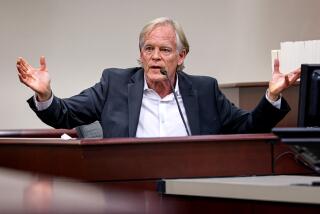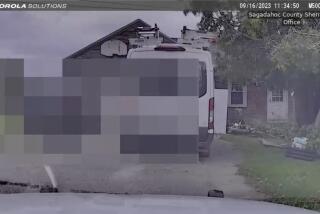Soldiers recall night of Afghan massacre
JOINT BASE LEWIS-MCCHORD, WASH. — An Army staff sergeant accused of killing 16 Afghan civilians in a middle-of-the-night shooting rampage returned to his base midway through the killings, woke up a fellow soldier waving his gun in his face and told him to “smell his weapon.” It smelled like carbon, the serviceman testified Monday.
“He said he’d just been to Alkozai, shot some people.... ‘I shot some military-age males.’ And I said, no you didn’t,” Sgt. Jason McLaughlin testified on the opening day of an Article 32 hearing for Staff Sgt. Robert Bales, who is charged with attacking two small farm villages during assaults that spanned five hours.
The two-week hearing in a military courtroom south of Seattle will include testimony from witnesses in the U.S. and Afghanistan to determine whether Bales should be held for a court-martial. He faces 16 charges of premeditated murder and six additional counts of attempted murder. Bales could be sentenced to death if convicted.
McLaughlin said Bales during his late-night visit told him he was going to the village of Najiban -- the scene of the second attack -- and he would be back at 5. McLaughlin said he was half asleep and didn’t believe Bales was serious.
“Then he grabbed my hand,” McLaughlin testified. “He said, ‘Take care of my kids.’ And I said, ‘No, Bob, take care of your own kids.’ And he left.”
The sergeant described the horror he felt when he learned later that March 11, as he began a 3 a.m. guard shift, that shots had been heard coming from the village of Alkozai. He was told that Afghan guards had seen an unidentified American soldier or soldiers first returning to, then leaving, the remote special forces camp in the Panjwayi district southwest of Kandahar.
A roll call was ordered, Bales was discovered missing, and McLaughlin and others were sent to the gate to yell Bales’ name.
Soon, after a search was launched, Bales emerged from the dark countryside, covered in blood and wearing an Afghan cape tied around his neck. His pants were torn, his face was covered in dirt, sweat and blood. His friends held their weapons at the ready.
“He just had a look of -- the absence of emotion.... It almost seems like somebody’s not present. Kind of ghost-like,” said Sgt. 1st Class Clayton Blackshear, who helped detain Bales at the gate after he laid down his weapons, an M-4 rifle, a pistol and a grenade launcher.
Bales seemed surprised to see soldiers waiting for him, Army prosecutor Lt. Col. Joseph Morse said at the hearing.
“Mac, did you rat me out?” Bales asked, according to Morse’s opening statement.
“He makes multiple admissions that not only did he commit these crimes ... [but] he was lucid, he was coherent, he was responsive,” Morse said.
“You will hear him apologize multiple times, not for doing the killings, but for letting the team down,” Morse said. “You’re going to hear Staff Sgt. Bales say, ‘It’s bad, it’s really bad.’ ”
The prosecutor said Bales told a colleague, “Some sick [expletive] is going to come out of this.”
Bales had spent part of the previous evening drinking Jack Daniels and diet Pepsi with McLaughlin and one other soldier. They watched “Man on Fire,” a Denzel Washington film about a former CIA operative who undertakes a campaign of revenge to hunt down and kill all those responsible for the kidnapping of a young girl in his charge.
Nobody became intoxicated, witnesses testified, though at least one said Bales joined Blackshear in snorting Valium, which Blackshear had been prescribed as a sleeping aid. Bales had for some time been taking steroids, he told friends, because he “wanted to get jacked,” McLaughlin testified.
Bales had been unusually short-tempered during the weeks leading up to the shootings, colleagues testified, telling of occasions when the 39-year-old veteran of four combat deployments punched out an Afghan truck driver who accidentally hit him in the nose with a box and yelled at McLaughlin over his driving.
Bales on the night of the shootings complained to fellow soldiers about losing out on a promotion and problems with his family at home. He was particularly irate that no action had been taken in response to two homemade explosives planted in a nearby village five days before the shootings, one of which blew off the leg of a U.S. soldier.
Under cross-examination by defense attorney Emma Scanlan, Master Sgt. Clifford Uhrich said he understood that 20 local men had been rounded up near a mosque and questioned about what they knew.
But nothing further had been done, unit members said, because the camp was short-staffed, and investigators hadn’t completed their work.
Blackshear testified about another eerie middle-of-the-night visit he received as he was almost asleep, shortly before Bales is believed to have left the compound. “A figure came in and sat down on the chair. I recognized the figure ... it was Sgt. Bales,” he said. Bales started talking about the IED attack.
“He expressed quite a bit of concern about, I guess, the [camp’s] actions after the incidents that we hadn’t done enough, or wanted to do more to try to find the people that were responsible,” Blackshear said.
Once officers at the camp discovered Bales was missing, a hostage rescue team was suited up in case he had been kidnapped. Flares were shot over the dark farm fields surrounding the camp, and a team was dispatched to launch a search.
He was soon spotted by a search team and a blimp outfitted with night-vision equipment. Almost with the clarity of daylight, the feed from the blimp, played at Monday’s hearing, showed a dark figure identified as Bales moving slowly through a farm field. The figure lies down in the foliage and disappears for several moments, then gets up again and begins moving.
Waiting for a helicopter to evacuate him, Bales exchanged a few words with fellow soldiers, at one point signaling to one of them that he wanted some bleach to clean his pants.
He seemed apologetic, Cpl. David Godwin said. “He said, ‘I thought I was doing the right thing.’ ”
--
More to Read
Sign up for Essential California
The most important California stories and recommendations in your inbox every morning.
You may occasionally receive promotional content from the Los Angeles Times.










